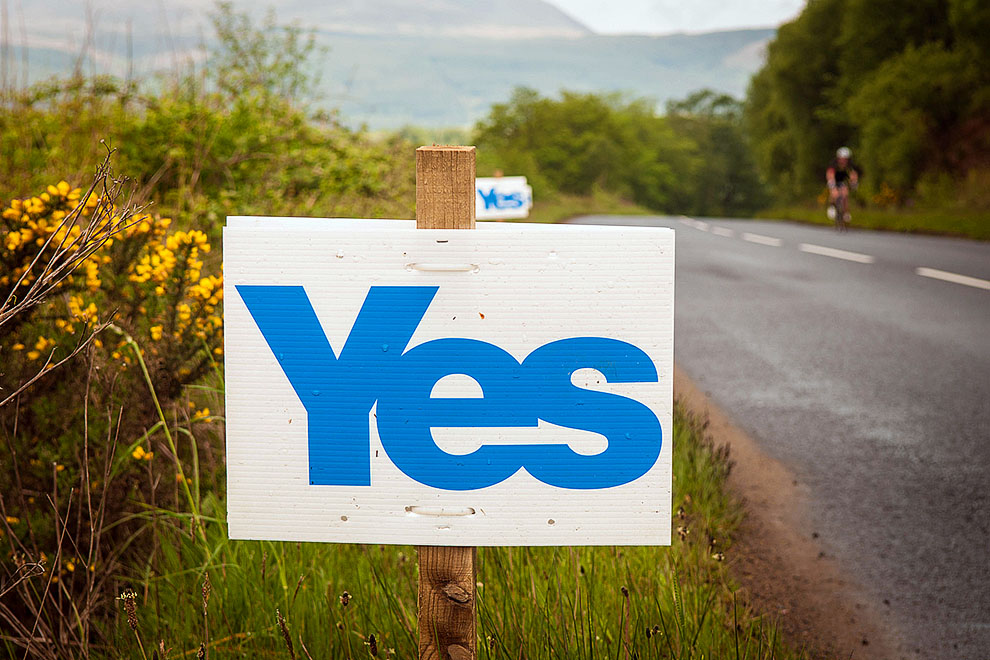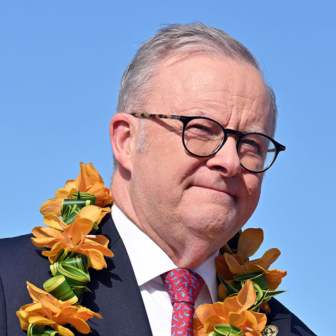When explorer James Cook first saw Grande Terre on 4 September 1774, the mountains of that Melanesian island reminded him of the Scottish highlands. “I called it New Caledonia,” his journal records, “and, if we except New Zealand, it is perhaps the largest island in the South Pacific Ocean.”
I can’t see it myself. In the past year, I’ve travelled both to Scotland and to New Caledonia. For the life of me, I couldn’t detect much resemblance between the Scottish glens and the mountain valleys of Grande Terre, the main island of New Caledonia that so bewitched Cook.
In spite of this, there’s one contemporary connection between old Caledonia and New Caledonia. In Edinburgh and Noumea, people are debating independence.
Over four million residents of Scotland, aged 16 and over, will go to the polls on 18 September to decide whether to stay with the United Kingdom or become an independent country. New Caledonia, one of Australia’s closest neighbours, is also scheduled to hold an independence referendum – in its case, sometime before 2018. Today, the French tricolour and the flag of Kanaky fly outside town halls, schools and other public buildings; within a few years, just one of them may be flying.
Many commentators regard debates about flags, sovereignty and statehood as a nineteenth-century anachronism. In the 1990s, as the Soviet Union imploded and Yugoslavia exploded, the “national question” was resolved in conflict and corruption, with an atavistic return to blood-and-soil nationalism. Decades later, there are new debates about borders and imagined communities, about cultural identity in a globalised world. The creative tension between nationalism and globalisation is being played out today in Scotland, Belgium, Spain, France and across the islands of Melanesia.
In his wonderful polemic, Arguing for Independence, the late Stephen Maxwell described globalisation as “the growth of multi-level interdependence between societies around the world, which limits the freedom of all states, while bearing down with particular weight on small states.” Maxwell, the leading intellectual of modern Scottish nationalism, welcomed interdependence. He believed that Scotland’s independence would improve relations with Europe and the rest of the United Kingdom, rather than create a permanent breach between neighbours.
His arguments echo the vision of the Kanak leader Jean-Marie Tjibaou, who campaigned for New Caledonia’s independence until his assassination in 1989. Tjibaou argued that independence from France would allow better relations both with Paris and with countries in our region: “It is sovereignty that gives us both the right and the power to negotiate our interdependences. For a small country like our own, independence allows us to determine our interdependences.”
As a modern capitalist economy, Scotland is fundamentally different from New Caledonia, a developing country struggling with the legacies of French colonialism. But the quest for independence unites the two nations.
With just over a week to the vote in Scotland, pollsters report a late surge in support for the Yes campaign led by the Scottish National Party, or SNP.
There’s a panicked tone to the interventions of Better Together, the unionist campaign led by former Labour chancellor Alistair Dowling. Their “Let’s stay together” initiative has wheeled out a range of politicians, celebrities, musicians and business leaders to highlight the damage that would be caused by a vote for independence.
The No campaign is mobilising supporters from across the spectrum. It doesn’t matter if you’re a Stones fan or a Beatlemaniac – both Mick Jagger and Paul McCartney have declared their opposition to independence. The Pope and atheist superstar Richard Dawkins agree that the break-up of the United Kingdom is a danger to global stability. Tony Blair, Hillary Clinton and the boss of BHP Billiton have all called for a No vote. J.K. Rowling is one of the many English-born residents of Scotland who will vote against independence.
Facing this parade of millionaires, the SNP has been joined in the Yes campaign by a range of left-of-centre groups that have traditionally been hostile to Scottish nationalism and the SNP’s pragmatic conservatism.
Polling shows that working-class voters are more likely to vote Yes than the rich, in the hope of protecting the social democratic advances that Scotland maintains over the rest of the United Kingdom (no tuition fees at university, free medical prescriptions for the elderly, booming investment in wind and hydro power, and policies to promote investment in the National Health Service).
During a visit to Scotland last year, I was struck by the diversity of grassroots organising, as the members of a broad coalition try to mobilise their neighbours and workmates in a debate about creating a different sort of society. One night, we travelled halfway across Edinburgh in the pouring rain to attend a community debate in Leith, but were turned away at the door. So many people had turned out that the organisers decided to give priority to the undecided, and were refusing entry to those who’d made up their mind or outsiders who couldn’t vote.
Another day, on a bus to Balmaclellan, we spotted a woman with a bag emblazoned with the simple slogan “Yes.” Later, over a cuppa in her home, she explained that she was an SNP member and responsible for doorknocking in Balmaclellan and nearby farms. “There’s another young lass from the next village who is involved in Radical Independence,” she explained. “She has green hair, but we get along pretty well – we’re both working for the same thing.”
From staid SNP supporters to the youthful troops of Radical Independence, from the artists of the National Collective to the activists of the Scottish Socialist Party, the act of voting Yes is part of a broader debate about the future. Should the Queen stay as head of state, or do we want a modern democratic republic? Should we stay in NATO and the European Union? The pound or the euro? How can we overcome Britain’s democratic deficit (no constitution, first-past-the-post voting and a House of Lords packed with Church of England bishops and the enemies of social democracy)?
The Yes campaign has remobilised a generation of Scots who have fought against a range of Westminster policies, from Maggie Thatcher’s poll tax to David Cameron’s bedroom tax, from Tony Blair’s invasion of Iraq to Britain’s bipartisan support for the £80 billion renewal of Trident nuclear submarines. In spite of the integration of Scottish elites in the British Empire, there hasn’t been a Tory majority in Scotland since 1955.
Our own English-born, Rhodes Scholar–educated Tory prime minister weighed in on the other side of the debate during a recent visit to London. “As a friend of Britain, as an observer from afar, it’s hard to see how the world would be helped by an independent Scotland,” Tony Abbott said in August. “I think that the people who would like to see the break-up of the United Kingdom are not the friends of justice, the friends of freedom, and the countries that would cheer at the prospect… are not the countries whose company one would like to keep.”
Abbott’s intervention in the independence debate was widely reported as a gaffe: in the past, his ideological enthusiasms have led to the occasional awkward statement, such as telling the US Heritage Foundation that “few Australians would regard America as a foreign country.”
Rather than a blunder, though, I’d suggest that it was a more calculated intervention. Abbott recognises that independence for Scotland would open a wider debate about neoliberalism and nuclear policy, the role of the secret state and the “Five Eyes” UKUSA alliance, the United Kingdom’s permanent seat on the UN Security Council, how Scotland and England will coexist in NATO and the European Union, the role of the banking sector – a complex debate that would upset the relaxed and comfortable.
His intervention also comes at a time when debates about self-determination and independence, about borders and sovereignty, are occurring around the world, from old Caledonia to New Caledonia, from Corsica and Catalonia to Bougainville.
You wouldn’t know it from the Australian media, but the Coalition government will soon be facing strategically significant debates about self-determination in our own region. Over the next five years, there may be major changes in two of Australia’s closest neighbours, as New Caledonia and Bougainville move towards a new political status.
Both islands suffered traumatic periods of armed conflict, in New Caledonia in the 1980s and in Bougainville in the 1990s. In spite of the widespread calls for independence, there were significant divisions within the population and both conflicts ended with innovative political agreements to delay a vote on a final political status.
Since 1998, both have been undertaking lengthy transitions towards a self-determination referendum and the possible creation of two new sovereign and independent nations. Indigenous peoples and migrant communities are debating cultural identity, the future role of mining, and how to develop a viable post-independence economy.
These transitional periods are now coming to a head. Under the 1998 Noumea Accord, New Caledonia is scheduled to hold a referendum before 2018. In a similar period, Bougainville will come to the end of the ten-to-fifteen-year transition initiated by the 2005 election of the Autonomous Bougainville Government. Will these referendums be held as scheduled, or will there be pressure to maintain the status quo in the interest of “stability”?
Tony Abbott has often spoken of the Anglosphere – his vision of a set of civic institutions marked by pluralism, democracy and fairness. But the term has taken on a broader strategic meaning in Canberra’s policy community, best shown in Keep Calm and Carry On: Reflections on the Anglosphere, a 2013 report from the Australian Strategic Policy Institute.
Institute director Peter Jennings argues that the Anglosphere has taken on a new meaning in the age of Edward Snowden. “A more modern term is the Five Eyes community,” he writes, “which refers to the post Second World War intelligence collecting and sharing relationship developed between the United States, United Kingdom, Canada, Australia and New Zealand.” His view is that “the Anglosphere demonstrates itself time and time again to be the engine of global order and the essential enforcer of international stability, even at a time of sweeping strategic change.”
Reflecting concern over China’s emerging strategic power, many Australian policy wonks argue that the old Anglo alliance must be strengthened in the Asia-Pacific region through closer cooperation with India (uranium sales), Japan (increased interoperability with ANZUS forces) and France (military cooperation in the South Pacific).
In recent years, both major parties in Canberra have welcomed France’s ongoing presence in the Pacific, arguing that the French state is a “positive influence in the region.” Australian think tanks like Jennings’s organisation and the Lowy Institute are holding strategic dialogues with French officials (but not Kanak or Tahitian leaders), promoting closer engagement with the French armed forces in the Pacific. This creates some tension with our closest island neighbours in Melanesia, which are actively supporting independence movements in New Caledonia and French Polynesia.
To the disquiet of leaders in Canberra, Jakarta and Port Moresby, Bougainvilleans and West Papuans are asserting their right to self-determination within postcolonial nations like Papua New Guinea and Indonesia. The issues of self-determination, autonomy and independence are on the agenda of organisations like the Melanesian Spearhead Group – a dilemma indeed, when many of your nearest neighbours are countries that cheer at the prospect of independence.
As Stephen Maxwell has argued, this issue is a very contemporary one. “It is not an accident that the right of the self-determination of peoples is so widely acknowledged,” he wrote. “It reflects a judgement that those best qualified to decide how a community should manage its collective interests are the members of that community. They are in the best position to know their own needs and the best options available to them for meeting those needs. They are more likely than anyone else to be guided by an enlightened self-interest in balancing the claims of individuals and minorities within the community against the claims of the majority and of present generations against those of future generations.” •




